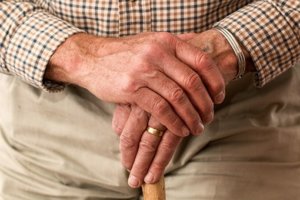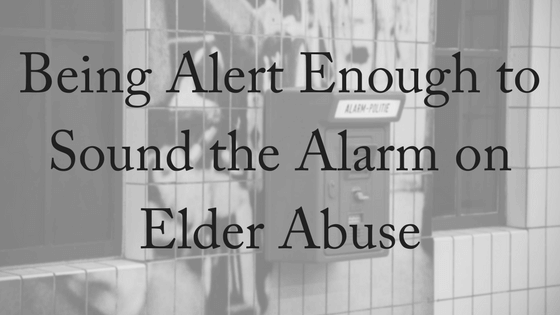It’s an unfortunate fact of our society that we must stay be alert for signs of elder abuse. Our elderly loved ones are vulnerable. Paying attention to them is not only essential for their general well-being, but also allows us to observe abnormalities. Elder abuse is all too common, but if we are alert enough to the signs of elder abuse then we will be able to sound the alarm.
During June, we observe World Elder Abuse Awareness Day. Across the country there are cities and community groups helping to raise a greater awareness and to educate the public on this increasingly occurring and insidious form of suffering. No family should think themselves immune. Being complacent about this issue means that we may miss an opportunity to intercede where we see signs of elder abuse. In the Brisbane and West Moreton region, there were 1084 reported cases of elder abuse last year. The latest Elder Abuse Prevention Unit report revealed a 20 per cent rise in elderly financial abuse cases in one year in Queensland alone, and a doubling of cases over the past decade. That’s a lot of elderly mothers, fathers, aunts or uncles.
[Tweet “There were 1084 reported cases of elder abuse in Brisbane and West Moreton last year.”]
 Ipswich District Crime Prevention officer in charge Sergeant Nadine Webster said it was important to highlight the fact that the elderly sometimes found themselves targeted by people who sought to take advantage of them or abuse them. “World Elder Abuse Awareness Day is vital for raising awareness of what constitutes elder abuse in the community and provides an opportunity for the community and organisations to get actively involved in the prevention, detection and reporting of elder abuse,” Sgt Webster said. “Throughout the world, abuse and neglect of older persons is largely under-recognised or treated as an unspoken problem. Unfortunately, no community or country in the world is immune from this costly issue.”
Ipswich District Crime Prevention officer in charge Sergeant Nadine Webster said it was important to highlight the fact that the elderly sometimes found themselves targeted by people who sought to take advantage of them or abuse them. “World Elder Abuse Awareness Day is vital for raising awareness of what constitutes elder abuse in the community and provides an opportunity for the community and organisations to get actively involved in the prevention, detection and reporting of elder abuse,” Sgt Webster said. “Throughout the world, abuse and neglect of older persons is largely under-recognised or treated as an unspoken problem. Unfortunately, no community or country in the world is immune from this costly issue.”
Elder abuse is: “any act within a relationship of trust that results in harm to an older person”. This can include physical violence, sexual violence, emotional abuse, neglect and financial abuse. Lawyers and health workers are reporting an alarming increase in financial abuse of the elderly as tough economic times, rising dementia cases and “an age of entitlement” creating targets of older Australians. Kristy Mackie, chairwoman of the Queensland Law Society Elder Law Committee, said the problem would become only worse as the population aged, without legislative reform and better protection for victims. In some cases, the granting of enduring power of attorney was done without sufficient diligence and became a “licence to steal”, she said.
Signs of Elder Abuse: Keep An Eye On Family Members
Elder financial abuse occurs when family members or caregivers (or others known to them) try to gain control of the older person’s financial resources to use them inappropriately. Sadly, family is most often to blame. A member of the victim’s family is responsible for elder abuse in 86% of cases. The most common perpetrator of financial abuse is the adult children of the older person.
“The victim is often depending on the perpetrator for care and placed in a position where they have to chose between protecting themselves from further abuse or destroying a family relationship,” says Ms Mackie. The rising abuse had been linked to adult children seeing the nest eggs of elderly parents as an easy source of funds as the cost of living and housing increased or they became greedy. Ms Mackie said the increase in abuse was also linked to the ease of getting a carer’s pension, with families moving in with elderly relatives so they could get free rent and receive government money.
 The most common forms of abuse were people being awarded power of attorney and misusing it, homes being transferred to family members and adult children moving into the family home “and you can’t get rid of them”. “We certainly seem to be in an age of entitlement where people say ‘Mum would have wanted me to have’ this even though she is sitting in a nursing home with dementia,” Ms Mackie said. “In these situations, the carers often don’t just take the carer’s pension, they refuse to give the parent access to any funds and they think they deserve for their mother to pay for a car or a holiday because they are stressed from looking after them.”
The most common forms of abuse were people being awarded power of attorney and misusing it, homes being transferred to family members and adult children moving into the family home “and you can’t get rid of them”. “We certainly seem to be in an age of entitlement where people say ‘Mum would have wanted me to have’ this even though she is sitting in a nursing home with dementia,” Ms Mackie said. “In these situations, the carers often don’t just take the carer’s pension, they refuse to give the parent access to any funds and they think they deserve for their mother to pay for a car or a holiday because they are stressed from looking after them.”
[Tweet “One of the most common forms of abuse is misuse of power of attorney.”]
Signs of Elder Abuse: True Stories
Although there are many more stories, here are some recent cases of elder abuse in Victoria:
- A woman with dementia who was financially exploited and abused by her daughter, who left her on the floor after a fall, withheld medications, and refused to feed her.
- A woman who was not believed when she reported being sexually exploited by the bus driver of an adult day service and was later asked to leave the day service.
- A woman who was alienated from her children and friends by her second husband, who repeatedly intercepted social workers’ attempts to reconnect her with her family.
- A woman whose daughter stole her pension, spent $60,000 on her credit card, and arranged for her mother to write a new will where she would receive her anticipated $170,000 inheritance in advance.
St Vincent’s Hospital Melbourne is the first health service in Australia to collect data on cases of suspected elder abuse. It found about one third of the victims were males, 49 per cent are aged over 80 years old, and most live in the same home or are dependant on the perpetrator. “The biggest issue is the shame and embarrassment because most abuse is being caused by an immediate family member and often they live in the same home,” St Vincent’s senior social worker Meghan O’Brien said. “Very few older people want to go down a pathway to cease the relationship with that family member. We have to respect them and their choices and then weigh that up against the risk factors.”
Recognising Signs of Elder Abuse
Learning to recognise the signs of elder abuse might be what helps you to help someone else. Some of the signs that may indicate an elderly loved one is being financially abused include:
- They don’t seem to have enough money for necessities.
- They have a new ‘friend’.
- If you have access to their bank statements and you can see things like large withdrawals from their account or unusual ATM activity.
At Estate Battles we believe it’s important to protect seniors against exploitation and abuse. We can help with the unique legal issues older people face, including cognitive deterioration, unscrupulous influence and elder abuse. For a FREE, 10-minute phone consultation with one of our elder law specialists then please contact us today.
If there is someone who is in immediate danger then always call emergency services on triple zero (000). In Queensland, for free and confidential advice for someone who suspects elder abuse or someone experiencing elder abuse then call the Elder Abuse Hotline on 1300 651 192.

